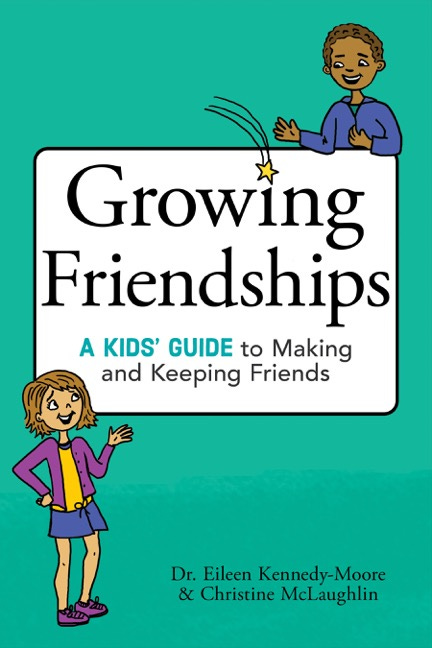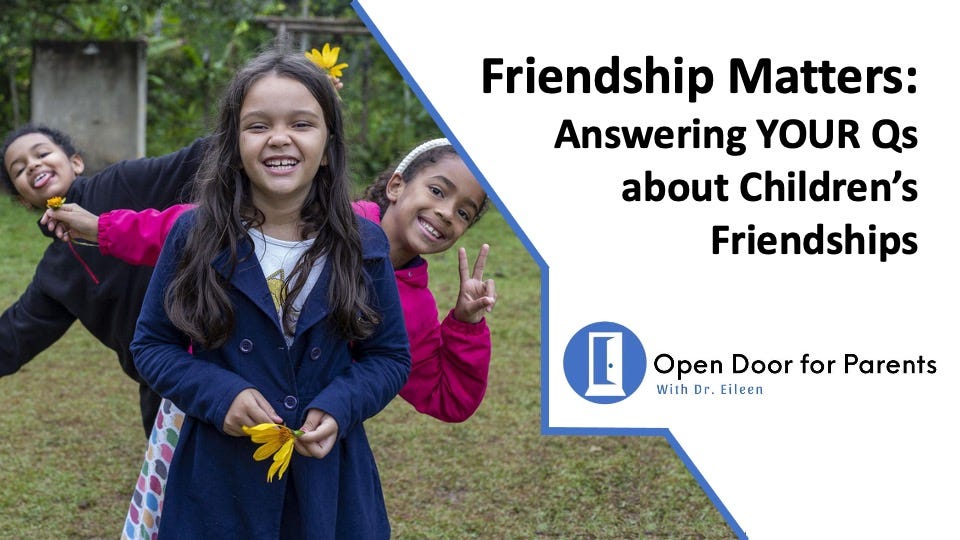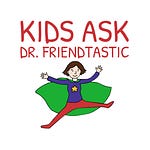(Would you rather read? A TRANSCRIPT is at the bottom of this post.)
Michael wants to know why some kids think it’s okay to physically push others.
Scroll down for some DISCUSSION QUESTIONS you can share with your child plus how to submit your child’s question.
Unlock the power of friendship!
Become a free subscriber to get the Kids Ask Dr. Friendtastic podcast episodes, transcripts, and discussion questions sent directly to your email.
Join now as a paid subscriber to access the tools you need to support your child's feelings and friendships. In addition to podcast episodes, you’ll get posts for parents, access to the full archive, the option to submit parent questions for the newsletter, PLUS invitations to paid-subscriber-only webinar events..
Please help the podcast grow!
I can’t do it alone. If you love the Kids Ask Dr. Friendtastic podcast, please help it continue and grow by sending in your child’s question about friendship and by asking your friends to submit their children’s questions. Here are the instructions:
Adults, please use your smartphone's memo function or an audio app to record your child's question. Hold the phone close to your child's mouth to make sure the recording is clear. Have your child state:
1) their FIRST NAME (or another name),
2) their AGE, and
3) a BRIEF QUESTION or concern about friendship. (Please do not include any friends' names.)
Email the audio file to DrF@EileenKennedyMoore.com. I’ll answer as many questions as I can. (Obviously, this is not psychotherapy, and it’s not for emergency situations.)
Think About It Questions to discuss with your child
Have you ever gotten negative attention from other kids? (In other words, were kids talking or yelling at you because they were annoyed about something you were doing?) What’s a good way to handle things when that happens?
Do you know a kid like the one Michael describes? Why do you think that kid does what he does? How does this kid’s actions affect their friendships?
Michael says the pushing happens “every time” this kid goes on the slide. Why do you think asking a grown-up to stand near the slide at the beginning of recess, before anything bad has happened, could be a useful idea? How might this be better than complaining after someone has been pushed?
Why might it be easier for the other kid to listen if Michael says, “Everyone needs to wait their turn” instead of “YOU need to wait your turn!”?
Go Deeper!
Want to learn more about how you can support your child’s feelings and friendships? My books and webinars–for parents and kids–give you in-depth understanding and practical, research-based ideas you can use immediately.
Featured Book
Growing Friendships: A Kids’ Guide to Making and Keeping Friends
By Eileen Kennedy-Moore, PhD, and Christine McLaughlin (Beyond Words/Aladdin)
for ages 6-12
A funny and useful guide to help children navigate the social world. Filled with cartoons and research-based tips.
“The secret playbook you’ll wish you’d had when you were growing up.”
— Diane Debrovner, executive editor, Parents magazine
BUY IT NOW on Amazon or wherever you buy books.
Featured Webinar
Friendships Matter: Answering YOUR Questions about Children’s Friendships (60 min.)
In this online conversation hour, Dr. Eileen delves into the most pressing questions from parents about kids and friendships. This informal Q&A session covers a wide range of topics from how to deepen casual friendships to recognizing when others feel left out. It also explores the delicate balance between meanness and bullying, and it provides you with practical tips on how to handle teasing that goes too far.
Transcript
Hi, there! I’m Dr. Eileen Kennedy-Moore, also known as Dr. Friendtastic. I’m an author and clinical psychologist based in Princeton, NJ.
Let’s listen to today’s question:
Hi, my name is Michael. I'm 10-years old, and there's this kid that every time he wants to go on the slide, and there's a kid on it, he pushes them down. And why does he think he can do that?
Hi, Michael. Wow, that sounds very annoying! You know it’s definitely not okay to physically push people. So why would this kid keep doing that?
One reason is: because he can. Because no one is stopping him!
But why would he even want to push someone? There are a lot of possibilities. Maybe he has trouble waiting his turn, so he pushes because he’s impatient to slide down himself. Maybe it makes him feel powerful to show that he’s strong enough to push another kid. Maybe he thinks it’s funny when the other kid is surprised or upset about being pushed.
But my best guess is that this kid is looking for attention from other kids and doesn’t understand the difference between positive and negative attention. Positive attention is when people pay attention to you, talk with you, play with you because they like being around you. Negative attention is when people notice and respond to you, but they do that because you’re bothering them, so they might yell or say stop.
Sometimes when kids can’t get positive attention, they go for negative attention, just to get some interaction. The annoying things they do are actually clumsy efforts to connect. But going for negative attention isn’t a path to friendship. In fact, it tends to push friends away.
Okay, so how can you handle this situation? One idea might be, at the start of recess, go to the grown-up in charge and ask if they could stand near the slide to keep an eye on things. This might make it less likely that kid will push anyone. Preventing a problem is usually easier than dealing with it after it happens, and we don’t want anyone to get hurt.
If he’s pushing kids in a dangerous way–maybe pushing them off the slide rather than just down it–that’s a safety issue, and you definitely need to tell an adult.
If this kid pushes one of your friends, that could be a chance for you to be an upstander and say something like, “Everyone needs to wait their turn without pushing!” It might be easier for him to listen if you say “everyone’ instead of “you.”
What about if he pushes you? You might want to say, in a loud, carrying voice that will get the teacher running over, “Keep your hands to yourself!” or “I don’t like being pushed!”
If this kid is sometimes nice and sometimes pushy, you may want to pay attention to him in a friendly way when he’s kind and act bored or walk away if he’s being pushy. Over time, this combination of more positive attention and less negative attention might help him learn kinder ways to connect with friends.
This has been Kids Ask Dr. Friendtastic. If you have a question about making and keeping friends that you’d like me to answer, go to DrFriendtastic.com, and click on the podcast tab to see how to submit your question.
And be sure to check out my books for kids about friendship: Growing Friendships: A Kids’ Guide to Making and Keeping Friends, and my new book, Growing Feelings: A Kids’ Guide to Dealing with Emotions About Friends and Other Kids. They’re available through your library or wherever you buy books.













Share this post